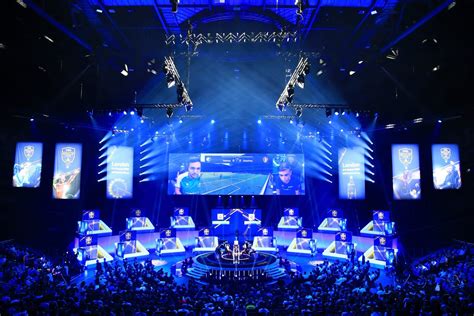The world of competitive gaming, also known as esports, has experienced a meteoric rise in popularity over the past decade. What was once considered a niche hobby has transformed into a billion-dollar industry, with high-tech gaming tournaments taking center stage. The evolution of esports has led to the creation of professional teams, leagues, and tournaments, attracting millions of fans worldwide.
At the heart of this phenomenon lies the thrill of competition, fueled by cutting-edge technology and innovative gaming platforms. High-tech gaming tournaments have become a spectacle, with top players and teams competing for coveted titles, prize pools, and international recognition. The excitement is palpable, with fans eagerly following the action, analyzing strategies, and cheering on their favorite teams.
The Rise of Esports
The modern esports landscape is a far cry from its humble beginnings. In the early 2000s, competitive gaming was largely confined to small, local tournaments and online communities. However, with the advent of live streaming, social media, and advanced gaming hardware, the industry began to gain momentum. Today, esports is a global phenomenon, with major tournaments and events drawing in massive audiences and prize pools.

One of the primary drivers of esports growth is the development of high-tech gaming platforms. Advanced hardware, such as powerful graphics cards, fast processors, and high-resolution displays, has enabled the creation of immersive gaming experiences. These platforms have, in turn, given rise to new genres, game modes, and competitive formats, further fueling the esports phenomenon.
Key Factors Contributing to Esports Growth
Several key factors have contributed to the rapid growth of esports:
- Advances in gaming technology: Improved hardware and software have enabled the creation of more realistic, engaging, and competitive gaming experiences.
- Live streaming and online platforms: The rise of live streaming services, such as Twitch and YouTube, has made it easier for fans to access and engage with esports content.
- Growing prize pools: Increasingly large prize pools have attracted top players and teams, further legitimizing esports as a competitive industry.
- Mainstream recognition: Esports has gained recognition from mainstream media, with major sports networks and news outlets covering high-profile tournaments and events.

The Future of High-Tech Gaming Tournaments
As esports continues to evolve, high-tech gaming tournaments are likely to play an increasingly prominent role. The integration of emerging technologies, such as artificial intelligence, virtual reality, and augmented reality, will further enhance the competitive gaming experience.

The future of high-tech gaming tournaments holds much promise, with potential developments including:
- Increased use of AI and machine learning: The integration of AI and machine learning algorithms will enable more sophisticated game analysis, player tracking, and predictive modeling.
- Advances in virtual and augmented reality: The adoption of VR and AR technologies will create more immersive gaming experiences, further blurring the lines between physical and digital competition.
- Growing importance of data analytics: The use of data analytics will become increasingly crucial, as teams and players seek to gain a competitive edge through detailed analysis and insights.
Conclusion
High-tech gaming tournaments have become a cornerstone of the esports industry, showcasing the skills and dedication of top players and teams. As the industry continues to evolve, it is likely that these events will play an increasingly prominent role, driving innovation and pushing the boundaries of competitive gaming.

Gallery of Esports Tournaments






Frequently Asked Questions
What is esports?
+Esports refers to competitive gaming at a professional level, often involving teams and players competing in organized tournaments and leagues.
What are the most popular esports games?
+The most popular esports games include League of Legends, Dota 2, Fortnite, and Overwatch.
How do esports players make money?
+Esports players can earn money through prize pools, sponsorships, merchandise sales, and streaming revenue.
